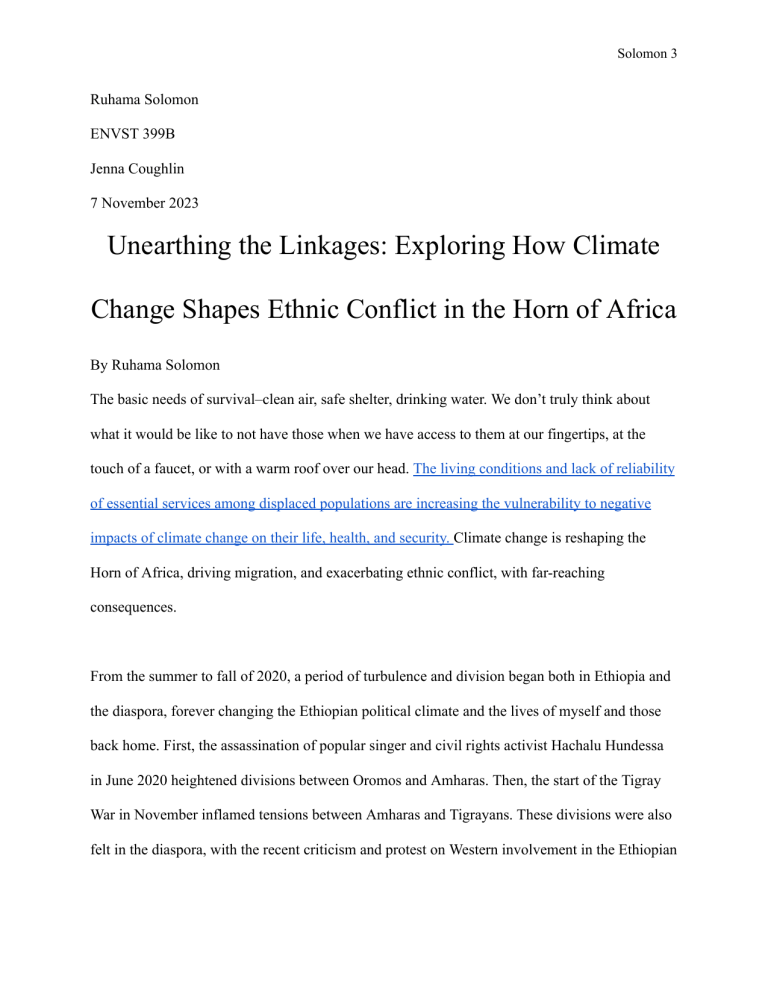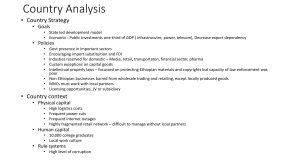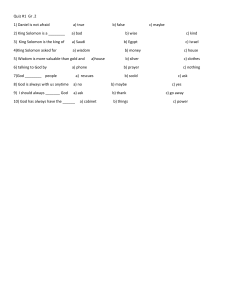
Solomon3 Ruhama Solomon ENVST 399B Jenna Coughlin 7 November 2023 Unearthing the Linkages: Exploring How Climate Change Shapes Ethnic Conflict in the Horn of Africa By Ruhama Solomon The basic needs of survival–clean air, safe shelter, drinking water. We don’t truly think about what it would be like to not have those when we have access to them at our fingertips, at the touch of a faucet, or with a warm roof over our head.The living conditions and lack of reliability of essential services among displaced populations are increasing the vulnerability to negative impacts of climate change on their life, health, and security.Climate change is reshaping the Horn of Africa, driving migration, and exacerbating ethnic conflict, with far-reaching consequences. From the summer to fall of 2020, a period of turbulence and division began both in Ethiopia and the diaspora, forever changing the Ethiopian political climate and the lives of myself and those back home. First, the assassination of popular singer and civil rights activist Hachalu Hundessa in June 2020 heightened divisions between Oromos and Amharas. Then, the start of the Tigray War in November inflamed tensions between Amharas and Tigrayans. These divisions were also felt in the diaspora, with the recent criticism and protest on Western involvement in the Ethiopian Solomon4 Civil War and fear of Ethiopia’s proclaimed sovereignty. In contrast, the people of Tigray called for the withdrawal of Ethiopian militia from the region. As someone of the Ethiopian diaspora in the United States, I have only been so exposed to the environment and climate in Ethiopia itself. In nearly every house we visited, Prime Minister Abiy Ahmed was on TV in the background. One of the biggest conversations at the dinner table would revolve over the political marginalization of Ethiopia. I grew up always envisioning what African wildlife looks like and how the climate is likely more consistent compared to the Minnesotan climate I was so used to. Because of the fact that my dad grew up surrounded by farmland, and my mom who inhabited the southern region of Ethiopia–where livestock live among the people and is mostly rural. When it comes to climate, in my family the rainfall that season was crucial for crops to stay alive. ➔ Personal Connection ◆ Tighten or polish the connection of families who have migrated to the United States and why… ➔ Recent news and context of ethnic conflict cases ◆ The impact of foreign investors in the region and its involvement ◆ How Sudan became a sheltering country for neighboring countries: Ethiopia, Sudan due to the effects of the Tigray War ◆ The UN establishing an Emergency Response Plan for Ethiopian Refugees ◆ How Sub-Saharan African governments segregating refugees and also lacking in economic capacity and resources ➔ How Ethnic Conflict relates to Climate Change Solomon5 ◆ Examples of conflict directly affecting scarcity ◆ The historical timeline of conflict the Horn of Africa (outside of Ethiopia) ➔ Pop Culture/Human Toll ◆ How does this problem affect a wider audience? Any parallels? ◆ How does these affect the vulnerable communities in more ways than one ➔ Call to Action ◆ Emphasize the urgency of addressing this ◆ Encourage conflict resolution efforts, international cooperation ◆ Explain how these relates back to myself and with what I want to pursue in the future ◆ Why shouldwecare? Solomon6 Work Cited Azzarri, Carlo, and Sara Signorelli. 2020. “Climate and Poverty in Africa South of the Sahara.” World Development125 (January): 104691.https://doi.org/10.1016/j.worlddev.2019.104691. Evans, MS, and B Munslow. 2021. “Climate Change, Health, and Conflict in Africa’s Arc of Instability.”Perspectives in Public Health141 (6):338–41. https://doi.org/10.1177/17579139211058299. Koubi, Vally. 2019. “Climate Change and Conflict.”Annual Review of Political Science22 (1): 343–60.https://doi.org/10.1146/annurev-polisci-050317-070830. Solomon, Negasi, Emiru Birhane, Christopher Gordon, Mebrahtu Haile, Fatemeh Taheri, Hossein Azadi, and Jürgen Scheffran. 2018. “Environmental Impacts and Causes of Conflict in the Horn of Africa: A Review.”Earth-Science Reviews177 (February):284–90. https://doi.org/10.1016/j.earscirev.2017.11.016. Sunga, Lyal S. 2014. “Does Climate Change Worsen Resource Scarcity and Cause Violent Ethnic Conflict?”International Journal on Minority & GroupRights21 (1): 1–24.


